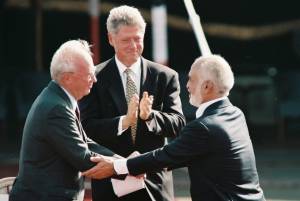It is unclear why Jordan rejected Israel as the two countries signed a peace treaty in 1994, which resolved the territorial disputes between the countries and included water-sharing agreements. The countries also signed a trade treaty in 1996, and economic ties since then have grown steadily.
Jordanian Parliament Speaker Atef Tarawneh announced on Tuesday that the Jordanian Parliament has refused to approve the attendance of an Israeli delegation at an international summit held in Jordan this week. Tarawneh added that the parliament called on the organizers of the summit to shun any Israeli representation at the event, Jordanian media reported.
He explained at a press conference that the Jordanian Parliament is demonstrating through this step that it holds a position different than that of the official Jordanian stance on the peace agreement with Israel. While the leadership’s policy is to maintain the peace agreement, the House of Representatives boycotts Israel and treats it as an enemy state.
The 2016 Women in Parliaments (WIP) Global Forum is scheduled to begin in Amman on Wednesday, marking the first time it has been hosted in the Middle East. According to the organizers of the forum, some 260 female politicians and parliamentary figures, including heads of state, former European and African prime ministers, and ministers from 89 countries have confirmed that they will attend the event.
Complex Israel-Jordan Relations

The signing of the peace treaty with Jordan, 1194. (Nati Shohat/Flash90)
Israel and Jordan signed a peace treaty in 1994, which resolved the territorial disputes between the countries and included water-sharing agreements. The countries signed a trade treaty in 1996, and economic ties since then have developed and grown. Two years ago, Israel and Jordan signed a $500 million natural gas deal effective for 15 years.
Israel’s security and intelligence ties with Jordan are more discreet, but have likewise strengthened and developed, especially since the Arab Spring uprisings in 2011 and the rise of the Islamic State.
Relations have also hit some rocky spots in recent years, however, especially over Jewish access to the Temple Mount compound. Jordan has repeatedly demanded that Israel prevent religious Jews from entering the site, which is holy to Jews and Muslims, and has even recalled its ambassador over the issue in the past.
Moreover, the Jordanian people, comprised mostly of Palestinians, mostly oppose the peace treaty and reject any form of normalization with Israel. The recent announcement by the speaker of the parliament reflects this position and it remains to be seen whether King Abdullah and his successors will continue to maintain ties with Israel in the future or if they will concede to public opinion at some point.
By: Michael Bachner/TPS
